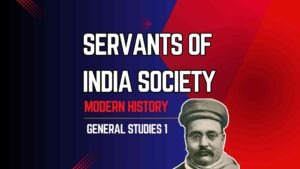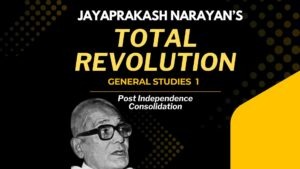Servants of India Society - Important UPSC Notes
Servants of India Society
🔷 Basic Facts (Important for Prelims)
Founded: 12 June 1905
Location: Pune, Maharashtra
Founder: Gopal Krishna Gokhale
Other Founding Members: G.K. Devadhar, A.V. Patwardhan, N.A. Dravid
Institutional Legacy: Gokhale Institute of Politics and Economics (est. 1930) – UGC-recognized research institute
🎯 Objectives of SIS
Public Service: Train men and women for dedicated public life rooted in spirituality and nationalism
Political Awareness: Spread awareness about civic duties and rights through constitutional and legal means
Nationalism through Service: Focus on nation-building through ethical conduct and personal sacrifice
Youth Engagement: Motivate Indian youth to engage in constructive social and national work
📜 Context & Contemporary Relevance (GS2: Governance & NGOs)
Current Issue (2025): GIPE has raised concerns of financial mismanagement in SIS, urging the government to appoint a neutral administrator
Relevance Today: Questions on governance, transparency, and management of legacy institutions
🕰️ Historical Importance (Pre-Independence Role)
Part of the Moderate Phase of the Indian National Movement
Advocated for constitutional reform and social service rather than militant nationalism
Influential Leaders:
V.S. Srinivasa Sastri – Member of the Legislative Assembly
Hriday Nath Kunzru – Social reformer and politician
A.V. Thakkar – Pioneer of tribal welfare
Mentorship Legacy:
Gokhale mentored Mahatma Gandhi, shaping his early political ideas
Gokhale also financially supported the setup of Sabarmati Ashram
Emphasized ethical politics, education, and social awareness – a precursor to Gandhian constructive work
🧭 Post-Independence Role and Contributions (GS2/GS1 – Social Issues & Society)
Diversified Focus Areas:
Education: Ran schools in rural and tribal areas
Rural Development: Agricultural training, watershed management
Women’s Rights: Fought against child marriage, widow discrimination, and inheritance inequality
Disaster Relief and Public Health: Healthcare camps and sanitation campaigns
Promotes:
Sustainable Agriculture
Clean Water Access
Child Welfare
Gender Justice
🧩Comparison: Servants of India Society vs Brahmo Samaj vs Arya Samaj
Core Focus:
SIS: Public service, civic education, and constitutional reform.
Brahmo Samaj: Religious and social reform within Hindu society.
Arya Samaj: Revival of Vedic values and reform of Hindu practices.
Approach:
SIS: Secular and socio-political; focused on ethical training for nation-building.
Brahmo Samaj: Spiritual and rationalist; emphasized monotheism and social equality.
Arya Samaj: Religious-nationalist; promoted Sanskritization and purification of Hinduism.
Nature of Work:
SIS: Trained individuals for public life, constitutional politics, and civic engagement.
Brahmo Samaj: Advocated widow remarriage, abolition of caste and priestly dominance.
Arya Samaj: Ran schools (e.g., Gurukuls), promoted Vedic education, opposed idol worship.
Impact on National Movement:
SIS: Directly contributed to moderate phase of freedom movement; trained leaders like V.S. Srinivasa Sastri.
Brahmo Samaj: Indirect; inspired social awakening and liberal reformers.
Arya Samaj: Indirect and sometimes confrontational; contributed to Hindu identity assertion.
Religious Orientation:
SIS: Secular, non-religious in organizational character.
Brahmo Samaj: Theistic and reformist within Hindu framework.
Arya Samaj: Strongly rooted in Vedic Hinduism.
Mains-Based Questions on Servants of India Society
1. “The Servants of India Society was the moral compass of India’s nationalist movement.” Elaborate.
(GS1 – Modern Indian History)
Answer Framework:
Introduction:
Introduce SIS as a socio-political organisation founded in 1905 by Gopal Krishna Gokhale.
Emphasize its aim to train ethical, service-oriented leaders devoted to national development.
Body:
✅ Moral Foundation of Early Nationalism:
Advocated for non-violent constitutional methods.
Promoted civic and political education grounded in ethics and public service.
✅ Leadership Development:
Mentored leaders like V.S. Srinivasa Sastri, Hriday Nath Kunzru, A.V. Thakkar.
Gokhale influenced Gandhi, shaping his initial approach to satyagraha and public work.
✅ Work Ethos and National Spirit:
Members took vows of poverty and selfless service.
Focused on political awareness, gender equality, and social justice.
✅ Ethical Governance Model:
Demonstrated how nationalism could be linked with moral responsibility and grassroots service.
Conclusion:
The SIS exemplified a unique blend of ethics, nationalism, and social reform—providing a model still relevant for contemporary leadership and governance.
2. Examine the contributions of the Servants of India Society in the socio-political transformation of India before and after Independence.
(GS1/GS2 – Modern History / NGOs and Social Welfare)
Answer Framework:
Introduction:
Founded in 1905 to promote selfless public service and constitutional nationalism.
Body:
🔷 Pre-Independence Contributions:
Political education and civic duty.
Constitutional methods over extremist approaches.
Supported Sabarmati Ashram; mentored Gandhi.
🔷 Post-Independence Role:
Expansion to women’s rights, education, rural development.
Operated schools, healthcare camps, sustainable farming, child welfare initiatives.
Worked against child marriage, widow discrimination, and inheritance inequality.
🔷 Enduring Legacy:
Gokhale Institute of Politics and Economics as a major academic contribution.
Model of ethical leadership and public service.
Conclusion:
SIS bridged freedom struggle ideals with development goals in independent India, reinforcing its historical and ongoing relevance.
3. Discuss the relevance of the ideals of the Servants of India Society in the context of governance and public service in contemporary India.
(GS2 – Governance / Ethics in Public Life)
Answer Framework:
Introduction:
SIS promoted selfless service, ethical leadership, and civic engagement—a rare model in today’s context of political cynicism and governance challenges.
Body:
🔹 Relevance of SIS Ideals:
Ethical leadership: Needed to counter corruption and declining trust in institutions.
Civic education: Essential for participatory democracy.
Public service motivation: Counteracts careerism in civil services.
🔹 Contemporary Applications:
NGOs adopting service-first approach.
Civil servants and politicians guided by values over populism.
Training youth for grassroots leadership in Panchayati Raj and urban local bodies.
🔹 Challenges in Upholding These Ideals:
Erosion of moral compass in public life.
Commercialization of NGOs and voluntary sector.
Political polarisation undermining constitutional ethos.
Conclusion:
The SIS stands as a timeless blueprint for value-driven governance—its revival can instill trust and integrity in public institutions.
4. “Moderate nationalism was more than political petitions; it was also a movement for moral and social transformation.” In light of this statement, assess the role of the Servants of India Society.
(GS1 – Modern Indian History)
Answer Framework:
Introduction:
Mention the criticism that early nationalists were too moderate.
Argue that SIS shows how moderation included profound social impact.
Body:
🔸 Moderate Tools, Radical Impact:
Constitutional methods shaped future Gandhian strategies.
Trained leaders with lifelong commitment to social service.
🔸 Moral and Civic Training:
Focused on civic responsibility, national education, and moral character.
Vows of poverty and integrity strengthened people’s trust.
🔸 Legacy of Transformation:
Promoted gender equality, child rights, education reforms.
Laid foundations for institutions like GIPE.
Conclusion:
SIS is proof that moderate nationalism had transformative social vision—often overlooked but deeply influential.
Prelims Questions based on Servants of India Society
-
Important Mountain Ranges in India
When preparing for UPSC, mapping is crucial. The exam often... -
Important Indian Maps – Political Boundaries
Important Indian Maps - Political Boundaries of India comprises of... -
Servants of India Society – Important UPSC Notes
Servants of India Society was founded by Gopal Krishna Gokhale.... -
Sea Level Rise at India’s Coastal Region – Important UPSC Notes
The World Meteorological Organization (WMO) released its State of the... -
Indian Urban Drainage Crisis – Important UPSC Notes
The post "Indian Urban Drainage Crisis" talks about the issue... -
Jayaprakash Narayan Important UPSC Notes
Commemorating the 51st anniversary of Jayaprakash Narayan’s (JP) “Total Revolution”... -
Sant Kabir Das – UPSC Notes
Sant Kabir Das Jayanti was celebrated on June 11, 2025,...








